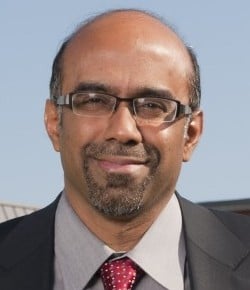This business professor isn’t afraid of his values
A.R. Elangovan shares his secrets to successful teaching
Share

Many teachers say that education is their calling. Professor A.R. Elangovan, of the Gustavson School of Business at the University of Victoria, has literally written the book (well, journal articles at least) on callings.
Naturally, his research caused a re-evaluation of the way he teaches Organizational Beahviour and leads as the International Programming Director of the school. Students have noticed, and so have colleagues. Elangovan is one of 10 new 3M National Teaching Fellows who have agreed to share their secrets to success.
Elangovan’s style might not seem radical, but if every business leader was taught the way his students are taught, it could have a profound impact on the world.
The Indian-born professor’s style was perfected a few years ago when he working on a paper with a religion professor about that elusive type of employee who doesn’t differentiate between “living life and earning a livelihood”—the type of employee who has found their calling.
Naturally, Elangovan turned the mirror on himself.
He realized that one’s calling does not have to line up with a job title—doctor, firefighter, singer or priest. A calling can be a core value adhered to in whatever you do—9 a.m. to 5 p.m. included.
“It took me a few years thinking about and doing research on this topic to finally realize that the essence of me, what’s driving me, is a very firm belief that everybody deserves a life of dignity,” says Elangovan. “The moment I started thinking like that, I changed what I do in the classroom.”
Most of Elangovan’s MBA students will one day be bosses. By helping their employees adhere to their core values—their callings—organizations are more likely to succeed. The job of a business teacher is to give students the confidence to build “enlightened workplaces,” he says.
To do so, he needed to move beyond simply imparting knowledge and encouraging students to apply that knowledge. “I’m no longer just a teacher,” says Elangovan. “I’m a vehicle with morals, ideas and answers. I’m willing to step into [students’] worlds, which are full of doubt and messiness, and answer when they say ‘what would you do in this situation?’”
Other professors feel they must steer clear of articulating the path they would take in a particular situation, lest they impose their values on students. Elangovan doesn’t maintain that distance.
“I have to have the courage to say, yes, this is what I would do,” he explains. “I give them the ideas and concepts, but I don’t hide behind the ideas and concepts.”
Another way that Elangovan is pursuing his calling is through his role as the International Programs Director. He’s an evangelist for seeing world through different eyes “and having all your assumptions shaken.”
Canada is dependent on trade. It’s also a country where the most talented often grew up in another cultural context. Those are the types of ideas business leaders can see with international study.
They’re also the types of ideas that can lead business leaders to choose the path of greatest dignity for their employees—whether in Canada or in factories on the other side of the Pacific.
Elangovan’s goal is for 100 per cent of his students to spend a semester in a foreign culture. Only a small proportion of students ever study abroad, but at his school, 73 per cent now do.
Elangovan is living up to his calling, so that his students—and their employees—might live up to their callings too.